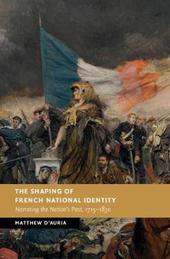
|
The Shaping of French National Identity: Narrating the Nation's Past, 1715-1830
Hardback
Main Details
| Title |
The Shaping of French National Identity: Narrating the Nation's Past, 1715-1830
|
| Authors and Contributors |
By (author) Matthew D'Auria
|
| Series | New Studies in European History |
|---|
| Physical Properties |
| Format:Hardback | | Pages:325 | | Dimensions(mm): Height 160,Width 235 |
|
| ISBN/Barcode |
9781107128095
|
| Classifications | Dewey:944.034 |
|---|
| Audience | | Professional & Vocational | |
|---|
|
Publishing Details |
| Publisher |
Cambridge University Press
|
| Imprint |
Cambridge University Press
|
| Publication Date |
3 December 2020 |
| Publication Country |
United Kingdom
|
Description
The Shaping of French National Identity casts new light on the intellectual origins of the dominant and 'official' French nineteenth-century national narrative. Focussing on the historical debates taking place throughout the eighteenth century and during the Restoration, Matthew D'Auria evokes a time when the nation's origins were being questioned and discussed and when they acquired the meaning later enshrined in the official rhetoric of the Third Republic. He examines how French writers and scholars reshaped the myths, symbols, and memories of pre-modern communities. Engaging with the myth of 'our ancestors the Gauls' and its ideological triumph over the competing myth of 'our ancestors the Franks', this study explores the ways in which the struggle developed, and the values that the two discourses enshrined, the collective actors they portrayed, and the memories they evoked. D'Auria draws attention to the continuity between ethnic discourses and national narratives and to the competition between various groups in their claims to represent the nation and to define their past as the 'true' history of France.
Author Biography
Matthew D'Auria is a Lecturer in Modern European History at the University of East Anglia. His main research interest lies in the relationship between images of the nation and discourses about Europe. Among his many publications on this topic are, with Mark Hewitson (eds.), Europe in Crisis: Intellectuals and the European Idea, 1917-1957 (2021) and, with Jan Vermeiren (eds.), Visions and Ideas of Europe During the First World War (2019). He is currently coediting, with Cathie Carmichael and Aviel Roshwald, The Cambridge History of Nationhood and Nationalism (forthcoming).
Reviews'Matthew D'Auria has written an important contribution to our understanding of French nationalism and French identity. His lucid and engaging book shows how intellectual debates about the origins of France resulted in the production of a powerful narrative about the national past that has ever since shaped the way the French understand themselves.' David A. Bell, Princeton University 'D'Auria masterfully charts a vast corpus of French intellectual history. Over more than a turbulent century, narratives and self-characterizations emerged and competed in which France remade its past and the remade past served to remake France. This elegant tour de force will be a lasting benchmark in the history of national identity-formation.' Joep Leerssen, University of Amsterdam 'Although the shaping of French national has attracted its share of scholarly attention, it is safe to say that no one has ever surveyed this particular terrain - the grand narratives of national development, in the crucial decades before and after the French Revolution - with such insight and illumination. Matthew D'Auria's success owes much both to the architectural skill with which he has constructed his overarching narrative, moving from Boulainvilliers through Montesquieu to Thierry, across three master-themes, race, character and class; but also to his clear and crisp writing. He offers an unignorable argument that is also a very great pleasure to read.' Kent Wright, Arizona State University 'Recommended. Advanced undergraduates through faculty.' D. A. Harvey, Choice 'The Shaping of French National Identity thus sheds light on a chapter of intellectual history never before investigated with such thoroughness, that of the battles between competing visions of national identity that coexisted over the course of the long eighteenth century; the focus of is the respective contributions of Gauls, Romans and Franks in French history, and the reflection on the role of the king, the nobles, and the rest of the population in creating the national imaginary... The volume unveils possible alternative images to that established in the second half of the nineteenth century and illuminates the paths and reasons for the affirmation of the hegemonic narrative. It is an approach to the question of national identity that can be innovative even within a vast and prestigious bibliography. Focusing on the idea of 'national narrative', this approach corrects some of the assumptions implicit in the so-called 'modernist' approaches.' Studi Francesi
|